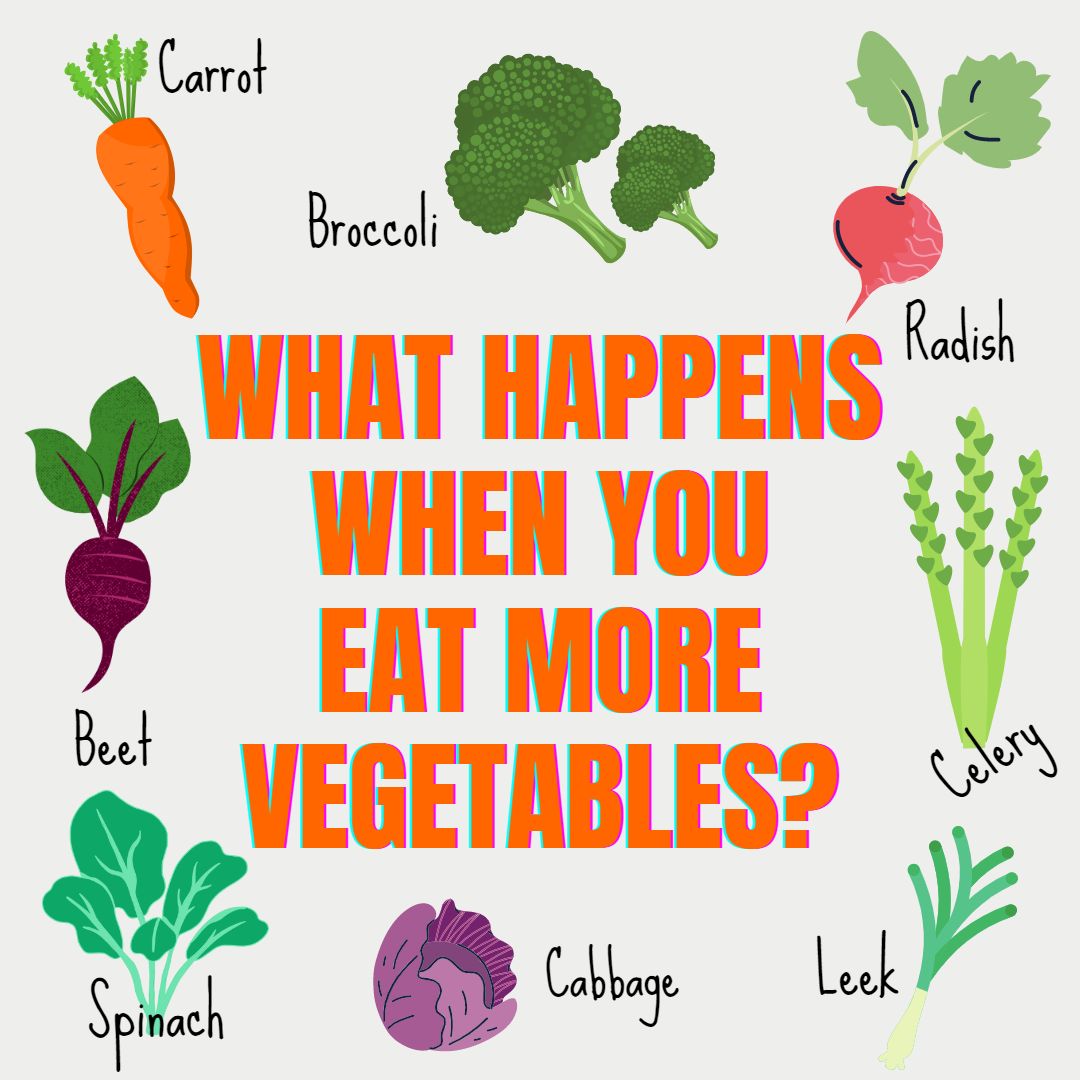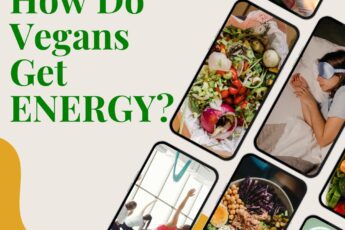As the saying goes, “You are what you eat.” And when it comes to your health, that couldn’t be more true. Eating more vegetables isn’t just a smart dietary choice, it’s one of the most powerful ways to support your body from the inside out. From clearer skin and better digestion to long-term protection against chronic disease, the impact can be remarkable.
As you explore the benefits of eating more vegetables, you’ll discover how they support everything from your energy and immune system to simple ways to include more of them in your daily meals.
Quick Note: I am not a healthcare professional. The information provided in this blog is based on widely available research, personal experience, and general knowledge about plant-based nutrition. Please consult a healthcare provider for personalized dietary or health advice.
What to Expect When You Start Eating More Vegetables
When you begin adding more vegetables to your daily routine, your body may experience:
- Improved digestion and gut health
- Boosted energy levels
- A stronger immune system
- Clearer skin and stronger hair
- Reduced cravings and better weight control
- Enhanced mood and mental clarity
- Long-term protection from chronic illness
These benefits are supported by numerous studies highlighting the essential nutrients and antioxidants in vegetables that contribute to overall wellness.
Why Your Body Thrives on Vegetables
Vegetables are low in calories, high in fiber, and rich in essential vitamins and minerals. Beyond their impressive nutrient profile, they contain antioxidants and plant compounds that support your body’s overall health and function. According to the HARVARD T.H. CHAN SCHOOL OF PUBLIC HEALTH, regularly eating more vegetables is linked to a lower risk of chronic diseases such as heart disease, type 2 diabetes, and certain cancers. Vegetables also help regulate blood sugar levels, reduce inflammation, and promote cellular repair. Many of these health benefits can begin to take effect within just a few weeks of increasing your vegetable intake.
Best Vegetables to Support Your Body
Some vegetables pack more nutritional punch than others, offering a powerful mix of fiber, vitamins, minerals, and antioxidants. Whether you’re just starting to add more vegetables to your meals or looking to expand your variety, these ten stand out for their nourishing benefits. They’re easy to find, simple to prepare, and a great foundation for plant-based meals.
Top 10 Nourishing Vegetables
- Spinach – Packed with iron, folate, and antioxidants like lutein and beta-carotene.
- Broccoli – High in fiber, vitamin C, and sulforaphane, a compound linked to cellular protection.
- Sweet Potatoes – Rich in beta-carotene (vitamin A), potassium, and slow-digesting carbs.
- Red Bell Peppers – Loaded with vitamin C, antioxidants, and a pop of natural sweetness.
- Brussels Sprouts – High in fiber, vitamin K, and compounds shown to support detoxification.
- Carrots – An excellent source of beta-carotene and vitamin K, great for eye and skin support.
- Kale – A nutrient powerhouse with vitamins A, C, and K, plus calcium and antioxidants.
- Cauliflower – Versatile and full of vitamin C, fiber, and glucosinolates that support digestion.
- Zucchini – Low-calorie and hydrating, with a good dose of vitamin C and potassium.
- Beets – Rich in natural nitrates, which may help support blood flow and energy levels.
Want to fast-track your veggie knowledge? Check out Medical News Today’s 15 HEALTHIEST VEGETABLES to start adding to your plate today.
How These Nutritional Powerhouses Strengthen Your Immune System
Leafy greens like spinach, kale, and collards are some of the most nutrient-dense foods on the planet. Just one serving provides a powerful blend of immune-boosting nutrients:
- Vitamin K for bone strength and blood clotting
- Vitamin A for healthy skin and immune function
- Vitamin C for collagen production and antioxidant protection
- Folate for red blood cell formation and DNA repair
- Iron and calcium for energy, oxygen transport, and muscle function
- Biotin for healthy hair growth and skin health
These greens also contain anti-inflammatory compounds that help your body stay in balance, especially when eaten consistently. By eating a wide variety of vegetables, you’re giving your immune system what it needs to thrive.
What Happens to Your Body When You Eat More Vegetables for Weight Loss?
Vegetables are an ideal food for weight management. They’re filling, hydrating, and packed with nutrients – all while being low in calories and fat. Increasing your veggie intake can help you feel full longer, reduce cravings, and improve digestion.
Because they’re high in fiber and water content, vegetables help stabilize blood sugar and reduce the likelihood of overeating between meals. Plus, their bulk helps you enjoy satisfying portions without the calorie overload.
Whether added to soups, roasted as a side, or blended into a smoothie, vegetables are a flavorful way to support your weight goals while keeping your body nourished.
How Vegetables Help You Look and Feel Your Best
Eating more vegetables doesn’t just impact what’s happening inside your body — it shows on the outside, too. Nutrients like vitamin A, vitamin C, and biotin play key roles in maintaining healthy skin and hair:
- Vitamin A promotes skin cell renewal and prevents dryness
- Vitamin C supports collagen production for firm, elastic skin
- Biotin helps strengthen hair and encourages healthy growth
When your diet is rich in colorful vegetables, you’re giving your skin and hair the tools they need to glow from within.
Easy Ways to Eat More Vegetables Every Day
Adding vegetables to your meals doesn’t have to be complicated. Start with small, consistent changes:
- Blend greens into smoothies – add spinach or kale to a fruit smoothie for a morning nutrient boost
- Build better salads – use a variety of greens like arugula, spinach, and romaine; toss in nuts, seeds, and a bright vinaigrette
- Snack smart – keep washed, cut veggies like peppers, cucumbers, and carrots ready for dipping
- Roast or air-fry favorites – try roasting broccoli, Brussels sprouts, or cauliflower for a flavorful side
- Add to what you’re already cooking – stir greens into soups, pasta dishes, and stir-fries
Want help getting started? Download the printable BEGINNER PLANT-BASED FOODS BOUNTIFUL VEGGIES (including how to season and cook them to perfection) to simplify your veggie prep.
Yes, Vegetables Can Contribute to Your Protein Intake
While they aren’t high-protein by volume, some vegetables still offer meaningful amounts of protein, especially when eaten regularly as part of a plant-based diet:
- 1 cup cooked broccoli: ~4g protein
- 1 cup cooked spinach: ~5g protein
- 1 medium sweet potato: ~2g protein
- 1 cup cooked Brussels sprouts: ~4g protein
- 1 cup cooked asparagus: ~3g protein
Including these in your weekly meals adds up fast, especially when paired with other plant-based protein sources like legumes, grains, and tofu.
Organic vs. Conventional Greens: Does It Matter?
When it comes to choosing between organic and conventional vegetables, the most important thing is simply eating more of them, whichever type fits your budget and lifestyle.
- Organic greens are grown without synthetic pesticides or GMOs. They’re great if you’re aiming to reduce exposure to chemicals.
- Conventional greens are typically more affordable and widely available, and still offer essential vitamins and minerals.
A good compromise? Prioritize organic for the most pesticide-heavy produce (like spinach and kale), and opt for conventional for sturdier, lower-residue items.
Whatever you choose, always wash your produce thoroughly with water (no soap needed). For more info, see the Academy of Nutrition and Dietetics’ guide on WASHING LEAFY GREENS.
Adjusting to a Higher-Fiber Diet: What to Expect
If you’re used to eating fewer vegetables, your digestive system may need time to adjust to the extra fiber. Temporary symptoms can include bloating, gas, or changes in bowel habits.
Here’s how to ease the transition:
- Start slowly — introduce new veggies in small portions and increase gradually
- Cook your veggies — steaming or roasting makes them easier to digest
- Stay hydrated — water helps fiber move smoothly through your system
- Add gut-friendly foods — ginger, fennel, or peppermint tea can ease discomfort
- Be patient — your gut microbiome will adapt, and those short-term changes often lead to long-term benefits
Final Thoughts: Start Reaping the Benefits Today
So, what happens to your body when you eat more vegetables? You feel better, look better, and set the foundation for long-term wellness. From clearer skin and stronger immunity to improved energy and digestion, these small daily choices make a big difference.
Start where you are. Add a handful of greens to your next meal. Keep colorful veggies on hand for snacks. Roast up a batch for the week ahead. However you do it, your body will thank you.






